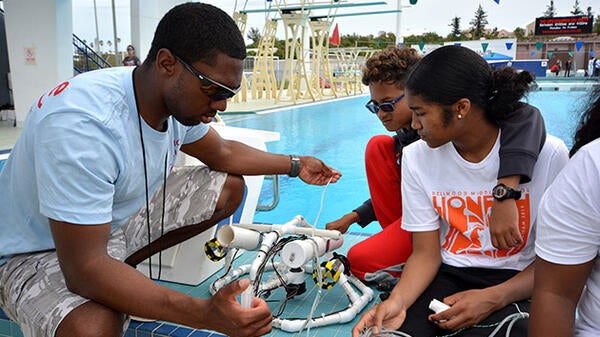Last month, twenty-one teams from nine schools—including a new team from Impact Mentoring Academy—met at the National Sports Centre for the 2019 Marine Advanced Technology in Education (MATE) Bermuda Regional Remotely Operated Vehicle (ROV) Challenge.
“Andrea” is Hurricane Season’s First Named Storm
May 29, 2019
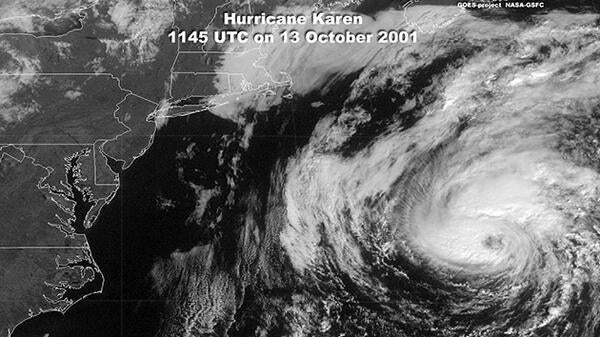
Subtropical Storm Andrea formed last week and was named by the National Hurricane Center in Miami, Florida, the agency responsible for monitoring all tropical disturbances in the Atlantic. This marks the first named storm of 2019, even before the official start of the Atlantic hurricane season, which begins June 1 and runs through November 30. Dr. Mark Guishard, program manager of the Risk Prediction Initiative at BIOS, explained how the storms form and their potential impacts.
Capturing the Beauty of Underwater Flight
May 29, 2019
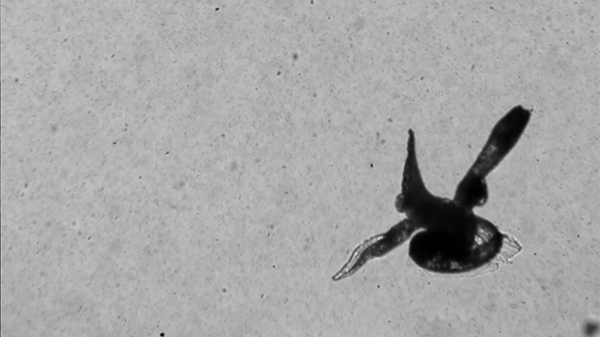
In mid-May artist Samm Newton drew the tubular mouthpiece, transparent shell, and delicate swimming foot of a heteropod from the Sargasso Sea, a type of tiny sea snail studied by BIOS biologist Amy Maas and collaborator David Murphy from the University of South Florida. Newton spent several hours repeatedly watching the video to reconstruct the creature’s anatomy. Her sketches will form the base of a series of much larger acrylic paintings destined for an upcoming Oregon-based art exhibit.
A Unique Look at the Seafloor Near Bermuda
April 26, 2019
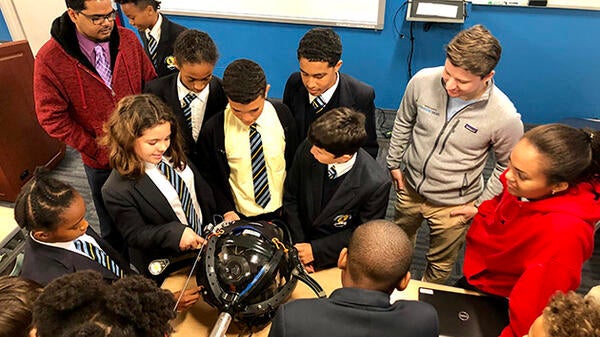
The sixgill shark approached the camera deployed from a boat floating five miles offshore Cooper’s Island in Bermuda, then did what sharks often do: tried to eat it.
After 29 Years, Ship’s Chief Engineer Hangs up His Hard Hat
April 26, 2019
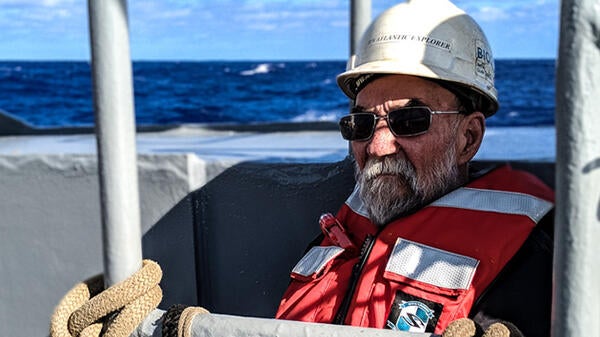
Around BIOS, and at St. David’s and St. George’s boatyards, Richard Smith is known by one name—Chief. The name reflects his role as chief engineer on the BIOS-operated vessel Atlantic Explorer, a role he held for 29 years, maintaining the vessel’s engineering and mechanical operations.
Smile and Say—Coral!
April 26, 2019

Many of the qualities that make Bermuda an attractive tourist destination—clear ocean water, a dazzling array of marine life, and temperate winters—also make it an ideal location for SCUBA training classes.
Ocean Science Education Abroad at BIOS
April 26, 2019
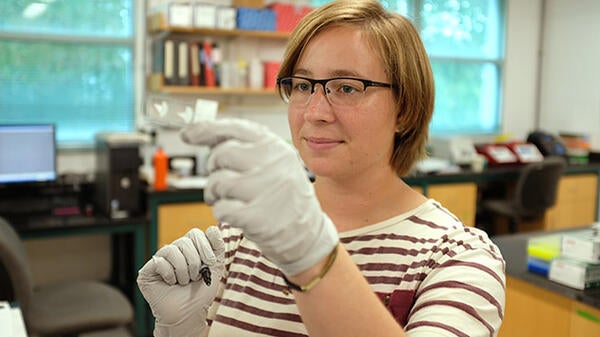
Beginning late August 2019, a select group of undergraduate students will embark on a new adventure in their education: a semester at BIOS as part of the National Science Foundation’s (NSF) Research Experiences for Undergraduates (REU) program. Initiated by NSF in 1958, the competitive program gives students the opportunity to participate in ongoing research programs or independent research projects in a wide range of science, technology, engineering, and mathematics (STEM) fields.
BIOS’s R/V Atlantic Explorer to Host Chief Scientist Training Cruise
May 30, 2014
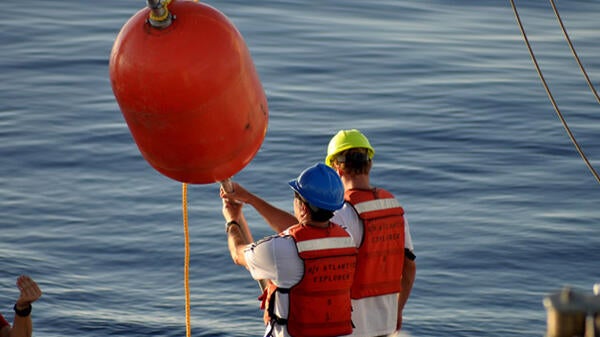
For young oceanographers, one of the most exciting components of their undergraduate and graduate education is the prospect of going to sea aboard a working research vessel, particularly if they get to conduct scientific research for their thesis or as a project technician. Unfortunately, for many students—particularly those at smaller institutions or not affiliated with larger, well-established research programs—obtaining funded shiptime remains a significant hurdle in their practical education.
BIOS Internships Result in Peer-Reviewed Scientific Publication for Two Students
March 15, 2014
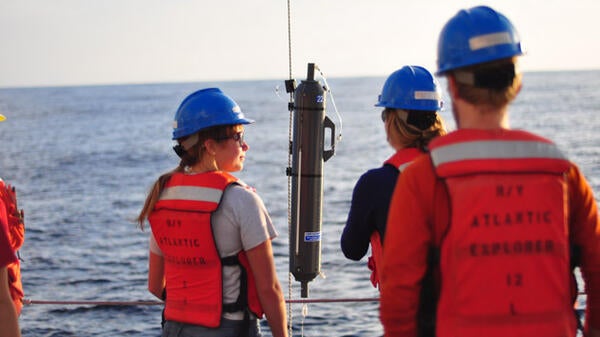
Internships at BIOS offer many benefits to students pursuing future studies or careers in the oceanographic and atmospheric sciences, including practical experience, mentorship, and—for some—the opportunity to publish the results of their research in a peer-reviewed scientific journal. For students continuing into Ph.D. programs, this latter benefit can be particularly helpful in gaining admission into choice schools and securing paid research with specific labs and faculty members.
BIOS Time Series Helps Scientists Confirm Ocean Acidification
February 28, 2014
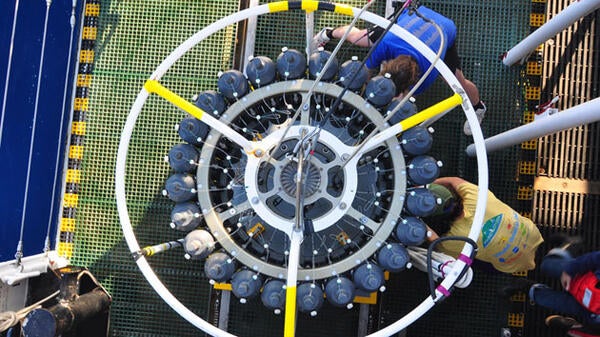
Sustained ocean observations provide the foundation for much of the chemical and physical oceanographic research that’s taking place around the world. Such observations, collected over the years and sometimes decades, give scientists insight into global cycles, regional variability and seasonal trends, and long-term changes in ocean chemistry.
